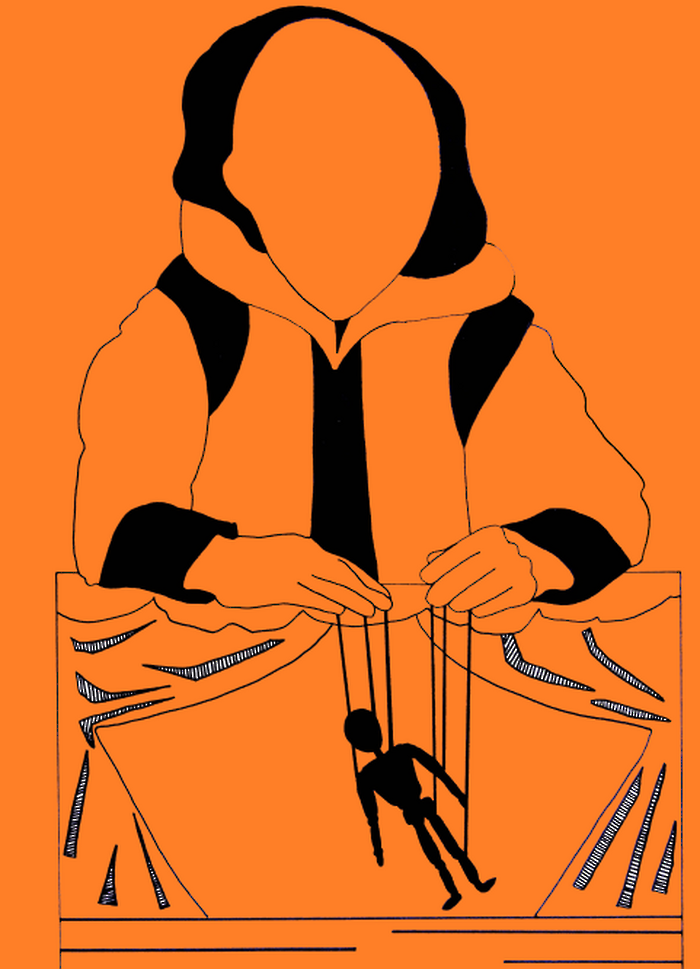Hangmen review
A fun, entertaining showcase of McDonagh’s signature gallows humour, but dark comedy needs to be darker

With a script composed of sharp, witty dialogue and a repertoire of wonderfully eccentric characters, the dark comedy Hangmen, written by Martin McDonagh, cannot fail to disappoint. This rendition from the Downing Dramatic Society certainly delivers on the script’s promise to get you laughing in the face of a theme as morbid as capital punishment, although certain aspects of the staging and some of the performances hindered the shocking and unsettling potential of the gallows humour for which McDonagh’s work is so renowned. Though he has been more well-known in recent years for his successful career in film, with the popularly and critically acclaimed In Bruges (2007), Seven Psychopaths (2012) and the Oscar-nominated Three Billboards Outside Ebbing, Missouri (2017), Martin McDonagh’s storytelling is so well suited to the stage.
"Much of the play’s tension from the start is built on the clash of personalities between Harry and Mooney"
Hangmen is mostly set in the year 1965, when the death penalty for murder is abolished in Britain. The story centres on the former executioner turned pub-owner, Harry Wade (Matthew Paul), and poses the following question: what's the second-best hangman in England to do on the day they've abolished hanging? Harry may seem to be enjoying post-retirement life in Oldham with his wife, Alice (Sophia Slater) and his teenage daughter, Shirley (Sam Creswick), spending his evenings jovially hosting his pub regulars. But his dark past comes back to haunt him, in the form of his old assistant, Syd (Francesca Cahill), who appears to express doubts about the justice of their last hanging, a man named Hennessey (Cameron Burnett), executed on the charge of murdering a young woman. The future of Harry’s peaceful retirement is also disrupted by the mysterious arrival of Mooney (Philip Coxon), a charming stranger with unknown motives who flirts with Harry’s daughter and who is clearly marked as an outsider, from somewhere down south.
Much of the play’s tension from the start is built on the clash of personalities between Harry and Mooney, between an old man and young man, between a northerner and a southerner. Much of the drama hinges on the performances of these two leading actors, which were thoroughly enjoyable for their comic delivery. Harry thrives on the banter in the pub and smiles with nostalgic pride of his career as hangman, speaking so gleefully about killing and death as if it were but trivial sport; while Mooney is presented as a self-entitled, arrogant intruder who moves freely around the space of pub as he so pleases, claiming the stage as own and making disrespectful, elitist remarks and insults to northerners. Matthew Paul and Philip Coxon are so entertaining to watch for their portrayals that ridicule the two main characters, but the darker sides of the drama did not seem to receive the same attention: the retired hangman only occasionally expresses the existential dread of having his life’s work being made obsolete, and the mysterious intruder from the south, who harbours secrets and ulterior motives, did not always seem as menacing or unsettling as he was trying to come across.
Besides the leading men, the solid performances from the two main female actors deserve praise. Although McDonaugh stories tend to contain a lot of rough, brutal pissing-contests of arrogant, masculine banter, some of my favourite scenes were the interactions between mother and daughter. Sophia Slaters portrayal of Alice conveyed a frustration and a strength to fight for her home, for her family, and to talk back at the men, putting them in their place; while Sam Creswick’s Shirley can be shy and fragile, young and impressionable, keeping herself safely tucked away from the main sites of confrontation of the stage, but expressing the curiosity and anxiety of coming-of-age.
However, on the note of being tucking oneself away, the staging of play somewhat limited the potential of the actors’ performances because the space felt very clogged with set items. Many of the key confrontations between characters took place behind the bar or the table, restricting most of the performers’ movement. One of the few character’s who broke free from such spatial restrictions was Pierrepoint (Fraser Rosser-Smyth), formerly the number-one hangman in England and Harry’s rival, who gets right in Harry’s face. Of course, this particular character was naturally inclined to be a more dominating presence, but the others could really have benefitted from not being so restricted the set, and really could get right in the audience’s face as well.
But, overall, this play is a fun, high-energy spectacle and a solid stream of jokes and punchlines. Even though the cast could have perhaps expressed more horror and dread in addition to the wildly entertaining farcical elements of the drama, this showcase does do justice Martin McDonagh’s comic wit.
 Features / Cloudbusting: happy 10th birthday to the building you’ve never heard of30 March 2025
Features / Cloudbusting: happy 10th birthday to the building you’ve never heard of30 March 2025 News / Uni offers AI course for Lloyds employees30 March 2025
News / Uni offers AI course for Lloyds employees30 March 2025 News / Caius clock hand returned nearly 100 years after student prank31 March 2025
News / Caius clock hand returned nearly 100 years after student prank31 March 2025 News / Hundreds of jobs to be cut at Cambridge University Hospitals1 April 2025
News / Hundreds of jobs to be cut at Cambridge University Hospitals1 April 2025 News / Ski mask-wearing teens break into Caius accommodation27 March 2025
News / Ski mask-wearing teens break into Caius accommodation27 March 2025





